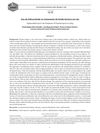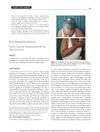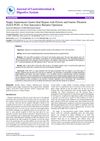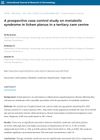 9 citations,
May 2018 in “International Journal of Current Microbiology and Applied Sciences”
9 citations,
May 2018 in “International Journal of Current Microbiology and Applied Sciences” Certain plant compounds can help treat diabetes.
[object Object]  December 2022 in “Korean journal of medicinal crop science/Han-gug yagyong jagmul hag-hoeji”
December 2022 in “Korean journal of medicinal crop science/Han-gug yagyong jagmul hag-hoeji” Natural extracts like ginseng, green tea, shiitake, and aloe vera may help prevent hair loss by protecting hair-related cells.
 January 2020 in “Acta Scientiae Veterinariae”
January 2020 in “Acta Scientiae Veterinariae” Hydrocolloid dressings significantly improved healing of a dog's third-degree burn.
 18 citations,
February 2010 in “Odontology”
18 citations,
February 2010 in “Odontology” The document concludes that Rabson-Mendenhall syndrome requires novel treatments for insulin resistance and emphasizes the importance of dental care in affected patients.
 15 citations,
June 2018 in “Life Sciences”
15 citations,
June 2018 in “Life Sciences” Diabetex improves diabetic wound healing better than metformin.
 10 citations,
January 2010 in “PubMed”
10 citations,
January 2010 in “PubMed” Adjuvants, diet changes, and laser therapy may improve male pattern hair loss.
 9 citations,
December 2022 in “Antibiotics”
9 citations,
December 2022 in “Antibiotics” Coconut seed extract may effectively treat scabies in rabbits by killing mites and reducing inflammation.
 9 citations,
April 2020 in “Endocrinology, diabetes & metabolism case reports”
9 citations,
April 2020 in “Endocrinology, diabetes & metabolism case reports” Pregnancy with Cushing's syndrome is rare and risky for both mother and baby, needing early diagnosis and treatment.
 4 citations,
November 2012 in “Dermatitis”
4 citations,
November 2012 in “Dermatitis” A man got severe skin irritation after using marking nut sap for hair loss.
 4 citations,
January 2008 in “Food Science and Technology Research”
4 citations,
January 2008 in “Food Science and Technology Research” Mature leaves of 'Saijo' persimmon have the most vitamin C and both mature leaves and new shoots are rich in polyphenols.
 2 citations,
January 2018 in “Biology and medicine”
2 citations,
January 2018 in “Biology and medicine” High testosterone levels in 20% of the women studied may indicate PCOS, while 80% had low levels with potential health impacts.
 1 citations,
November 2023 in “Naunyn-Schmiedeberg's archives of pharmacology”
1 citations,
November 2023 in “Naunyn-Schmiedeberg's archives of pharmacology” Henna has potential health benefits and can treat various conditions, but more research is needed to confirm safety and effectiveness.
 1 citations,
January 2017 in “Organic chemistry”
1 citations,
January 2017 in “Organic chemistry” Tridax procumbens has medicinal properties like healing, pain relief, and infection control.
 1 citations,
January 2016 in “Journal of gastrointestinal & digestive system”
1 citations,
January 2016 in “Journal of gastrointestinal & digestive system” The new bariatric surgery SAGI PGP is effective for weight loss and diabetes control with few complications.
[object Object]  February 2024 in “ComFin Research”
February 2024 in “ComFin Research” The soup mix with Avarampoo is a tasty, healthy alternative to energy drinks, offering various health benefits.
 January 2023 in “Pharma innovation”
January 2023 in “Pharma innovation” Polycystic ovary syndrome affects health and can be hard to diagnose, with treatments ranging from drugs to herbal remedies.
 January 2019 in “Current research in diabetes & obesity journal”
January 2019 in “Current research in diabetes & obesity journal” A woman with type 2 diabetes developed alopecia areata, suggesting a link between the two autoimmune conditions.
 August 2017 in “International Journal of Research in Dermatology”
August 2017 in “International Journal of Research in Dermatology” Lichen planus is not linked to metabolic syndrome, but it is associated with higher rates of high blood pressure, high triglycerides, and low HDL cholesterol.
 November 2013 in “John Wiley & Sons, Ltd eBooks”
November 2013 in “John Wiley & Sons, Ltd eBooks” Skin symptoms can indicate endocrine disorders and have various treatments.
January 2021 in “Menoufia Medical Journal” People with early-onset androgenetic alopecia may have a higher risk of heart disease due to abnormal blood lipid levels.
 January 2021 in “Journal of Research in Medical and Dental Science”
January 2021 in “Journal of Research in Medical and Dental Science” Men with certain patterns of hair loss, especially the U pattern, are more likely to develop insulin resistance.
 75 citations,
June 1999 in “Pediatric Clinics of North America”
75 citations,
June 1999 in “Pediatric Clinics of North America” The document concludes that early recognition and treatment of PCOS in adolescents is crucial for managing symptoms and long-term health risks.
 22 citations,
June 2017 in “Advances in Clinical and Experimental Medicine”
22 citations,
June 2017 in “Advances in Clinical and Experimental Medicine” Polycystic ovary syndrome (PCOS) was first described in 1721, officially diagnosed in the 1990s, and is now known to be partly genetic and linked to insulin resistance, with increased risk of cardiovascular disease and carbohydrate metabolism issues.
7 citations,
November 2006 in “Journal of immunological methods” The method can help diagnose and monitor diabetes by analyzing hair.
Testosterone raises blood pressure by affecting kidney function and brain gene regulation over time.
 April 2023 in “Journal of Investigative Dermatology”
April 2023 in “Journal of Investigative Dermatology” Aging changes skin cells, leading to different DNA methylation and gene activity, affecting cell metabolism and aging signs.

High insulin levels are more common and a better predictor of carbohydrate issues in women with PCOS than glucose tolerance tests.
 September 1997 in “JEADV. Journal of the European Academy of Dermatology and Venereology/Journal of the European Academy of Dermatology and Venereology”
September 1997 in “JEADV. Journal of the European Academy of Dermatology and Venereology/Journal of the European Academy of Dermatology and Venereology” Blocking IL-1 could help treat some hair loss conditions; alopecia affects liver detox systems; spironolactone is better than finasteride for female hair growth; focusing on the catagen hair phase could lead to new alopecia treatments.
January 2022 in “Stem cell biology and regenerative medicine” Improving dermal papilla cells can help regenerate hair follicles.
 815 citations,
April 2010 in “The Journal of Clinical Endocrinology & Metabolism”
815 citations,
April 2010 in “The Journal of Clinical Endocrinology & Metabolism” Women with PCOS should be screened for heart disease risk and manage their health to prevent it.


























